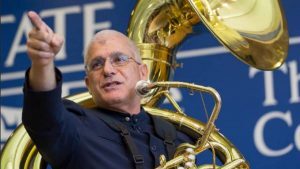When Sam Pilafian was 11, he was told that if he switched from the accordion to the tuba, he would always have friends. When he passed away on April 5 from colon cancer at the age of 69, The New York Times described him as “a virtuoso tuba player who performed an eclectic mix of classical, jazz, pop and rock music and brought unflagging exuberance to teaching young tubists.”

I met Sam a dozen or so years ago when he brought a Dixieland band made up of Arizona State University students—with Sam on tuba—to one of our jazz society sessions. His accomplishments throughout his career ranged from the ultimate to the sublime.
He was invited by Leonard Bernstein to perform on-stage in the world premiere of Bernstein’s MASS, which opened the John F. Kennedy Center for the Performing Arts in 1971.
A natural entertainer, he was once nicknamed “the Evel Knievel of the Tuba” for playing “The Clarinet Polka” while standing on his head. He also tried teaching the tuba to Fred Rogers on an episode of Mr. Rogers’ Neighborhood in 1985. “You have to blow through buzzing lips,” Sam told Rogers, who responded, “Your lips tickle.”
As one of his contemporaries said, “He could do everything—play all kinds of music—and he could light up a room.”
Early Honors
Sam Pilafian graduated from the University of Miami and won the concerto competition at the National Music Camp in Interlochen, Michigan, becoming only the second tubist in over 50 years to do so. He subsequently won fellowships at Dartmouth College and the Tanglewood Music Center.
While living in Florida, he played in hotel orchestras that backed headliners like Frank Sinatra and Liza Minnelli and also had a six-piece Dixieland band that held forth at area race tracks. He was a founding member of the Empire Brass Quintet, whose repertoire ranged from Renaissance and Baroque music to classical works and show tunes, and also of the large brass ensemble, Summit Brass. He created the Travelin’ Light duo with acoustic guitarist Frank Vignola, dedicated to Swing, jazz standards, and the classics.
As a soloist who has 15 CDs to his credit, he performed and recorded with the Boston Symphony, New York Philharmonic and Metropolitan Opera Orchestras, Duke Ellington, Lionel Hampton, and Pink Floyd. In addition to Arizona State, he taught at Boston University, Berklee College of Music, and the Tanglewood Institute, and was the recipient of numerous awards.
He co-authored the best-selling pedagogy texts and DVDs: Breathing Gym and Brass Gym. He won a 2006 Spirit of Disney Award for creativity and design in a Drums Corps International Gold Medal-winning performance, and a 2009 Emmy Award for best instructional/educational video from the National Association of Television of Arts and Sciences. He served as president of the International Tuba Euphonium Association, and also T.U.B.A., a worldwide tuba organization.
♫ ♫ ♫ ♫
Evan Christopher, he of the Clarinet Road, made some cogent comments of why April is a special month in New Orleans: “The month of April is when local musicians take center stage. Hundreds of us take full advantage of the increased attention on our integral role as culture-bearers in one of the last cities whose identity is driven by its indigenous music. Creative collaborations abound, scores of new recordings get released, and thousands of visitors come expressly to hear our music. Bolstering our pride in what we do, our spirit is more generous than usual.
“The French Quarter Festival truly brings out that generosity of spirit. It’s our annual gift to New Orleans. It’s a free festival, and we help keep it that way. This isn’t a commentary on our compensation; that’s another conversation. It’s more of a testimony to our dedication to the traditions we represent as well as our gratitude. We welcome being more than an extension to city’s tourism and hospitality industry.
“The Jazz & Heritage Festival is a juggernaut that is in its 49th, or 50th, or 51st year, depending on who you ask. For these two weekends, we also try to set aside our ambivalences. In the face of a disproportionate empha$i$ on national acts unrelated to our hyper-local mettle, it’s the local legends who craft the magic moments talked about for years.
“Making these moments and galvanizing worldwide support for our contributions to the city’s culture is why the Festival Season is meaningful to musicians and lovers of New Orleans music.”
♫ ♫ ♫ ♫

Vocalist Rebecca Kilgore was recently in an accident that laid her up for an extended period of time. While crossing a street in a crosswalk in her current home town of Portland, Oregon, she was hit by a car that caused severe damage to her hip and femur. Here’s her description of what happened:
“I was hit by a car while I was walking in my neighborhood at dusk. The driver stayed around and was very shaken. She wasn’t driving fast, didn’t run me over, and I never lost consciousness (all good things). I went to the ER, and after a CT scan, it was determined I required a right hip replacement, which I received the next morning. At first the recovery was arduous, but now after almost three months, I’m walking unaided and doing pretty well. I’ve returned to gigging, slowly at first, and now I’m even traveling to gigs.”
Eddie Erickson, one of her long-time performing partners, established a GoFundMe campaign to assist in covering her medical expenses. Eddie wrote, “Rebecca Kilgore is a respected musician, vocalist and entertainer who earns her living as a working musician. Her inability to perform during her recovery period put a considerable financial strain on her and her family, and we are asking her many fans to help out during this difficult period.” The campaign URL is: www.gofundme.com/help-becky039s-recovery.
♫ ♫ ♫ ♫
Accompanying Pete and Will Anderson on their latest cross-country tour was jazz guitarist-composer-educator Felix Lemerle (pronounced fe-leeks luh-murl), a native of Paris, France. The son of an upright bass player, he studied classical piano at the CRR de Paris Conservatory and taught himself to play the guitar in his teens, winning the Eddie Lang Guitar Contest in 2012. He was granted a Fulbright scholarship to CUNY Queens College in New York, where he got his Master in Jazz Performance in 2016.
He is now living in Brooklyn and regularly performs in different settings from solo to big bands in this country and Europe.
♫ ♫ ♫ ♫
Arbors Records has released Scott Robinson’s latest CD: Tenormore. It’s his first all-tenor album and features Scott playing a silver 1924 Conn tenor sax, the first instrument he purchased from a Maryland antique store back in 1975. Scott is known for his diverse collection of instruments that include a theremin, ophiclleide, sarrusophone, alto clarinet, echo cornet, bass marimba, and contrabass banjo, but this time around, it’s all tenor sax. On one of the numbers, you’ll hear wife Sharon on flute.
♫ ♫ ♫ ♫
I enjoyed Green Book, the 2018 flick that cost $23 million to produce and went on to gross $311 million worldwide and win Academy Awards for Best Picture, Best Original Screenplay, and Best Supporting Actor (Mahershala Ali). It’s a loosely-structured story of African-American jazz and classical pianist Don Shirley being chauffeured on a 1962 tour of the segregated South by a working-class Italian-American bouncer from the Bronx. The film title comes from a mid-20th Century guidebook listing places that would accommodate African-American travelers.
Don Shirley (1927-2013) displayed immense talent at an early age, debuting in concert with the Boston Pops at age 18. He studied theory at the Leningrad Conservatory of Music in Russia. The London Philharmonic Orchestra performed his first major composition. He made his Carnegie Hall debut with Duke Ellington and the Symphony of the Air Orchestra in 1955. He soloed at Milan’s La Scala Opera House. He was the recipient of two honorary doctorates.
Despite the obstacles of segregation, he performed at prestigious venues and earned acclaim for his work with the Don Shirley Trio, showcasing a unique style that melded classical, spiritual and popular elements.
The Trio featured an unusual combination: piano, bass, and cello. Shirley would write bass parts in the cello range, and cello parts in a viola range. His aim was for it all to come together sonically like an organ. He had a Top-40 hit, “Water Boy,” in 1961.
Lew Shaw started writing about music as the publicist for the famous Berkshire Music Barn in the 1960s. He joined the West Coast Rag in 1989 and has been a guiding light to this paper through the two name changes since then as we grew to become The Syncopated Times. 47 of his profiles of today's top musicians are collected in Jazz Beat: Notes on Classic Jazz.Volume two, Jazz Beat Encore: More Notes on Classic Jazz contains 43 more! Lew taps his extensive network of connections and friends throughout the traditional jazz world to bring us his Jazz Jottings column every month.






















